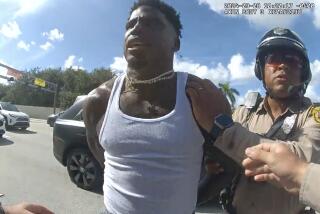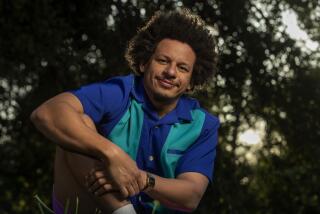Joe Morgan’s Suit Protests Drug ‘Profile’ : Civil rights: The former baseball star says he was unfairly targeted by police and arrested at LAX because he is black. A second trial on his claim is set.
- Share via
As they scanned the flow of passengers at Los Angeles International Airport, police detective Clayton Searle and his fellow narcotics officer searched for the likely companion of the suspected drug courier who stood handcuffed nearby.
When Searle noticed a short, muscular black man walk toward them and then turn abruptly toward a bank of telephones, the plainclothes Los Angeles police detective moved in quickly to question him.
Within minutes, however, their words had turned into violence, and the two men toppled to the terminal floor where Searle handcuffed his suspect and pulled him to his feet. Placing his hand across the man’s mouth, the officer then marched him away before a gathering crowd of gaping passersby.
Only later did Searle and his partner from the Drug Enforcement Administration realize that the suspected drug courier they had arrested on that March day in 1988 was Joe Morgan, the former Cincinnati Reds second baseman who was inducted Monday into Major League baseball’s Hall of Fame.
The 46-year-old Morgan, who is now an Oakland businessman and baseball broadcaster, is suing Searle and the city of Los Angeles in federal court, claiming that he was unfairly targeted because he is black and fit a certain “profile” that narcotics officers think a drug courier should look like.
“There’s no doubt in our mind that the only reason they stopped Joe Morgan was because he is black and he was the first black who happened to come by,” said William Barnes, one of the attorneys representing the former ballplayer.
The Morgan case also reflects a growing criticism of police use of the drug courier profile to stem the flow of drugs through airports.
“It’s purely based on race or dress, not on whether you are involved in any drug activity,” said Gary Trichter, a Houston defense lawyer and former police officer who specializes in such cases.
First developed in the 1970s, the drug courier profile was based on patterns of behavior believed to be used by those who use commercial airline flights to transport narcotics. Such suspicious behavior include erratic movements, paying for tickets with cash, using an alias, boarding a long flight without luggage and staying briefly in distant cities known to be sources of narcotics.
Last year, the U.S. Supreme Court ruled that government agents may stop and question airline passengers who look and act like drug couriers. But the court said brief detentions must be based on a person’s behavior, not just on race or appearance.
“Profiles are important and we use them, but exactly how we use them or what the profile is I cannot tell you,” said Los Angeles Police Department Cmdr. William Booth. “It is certainly not something based on any prejudice or racism. It’s based on trying to protect the public.” He said that last year, 254 narcotics arrests were made at Los Angeles International Airport. Through Aug. 3 of this year, there have been 121 such arrests.
Frank Schults, chief of public affairs for the DEA in Washington, denied that his agency uses drug courier profiles.
“We have any number of investigative techniques and ways to identify people involved in moving drugs, but a profile is not one of them,” he said.
Neither Booth nor Schults would comment on the Morgan lawsuit, which is scheduled to go to trial for a second time next month in Los Angeles. Morgan is seeking unspecified damages, claiming that his civil rights were violated.
Last April, a six-person federal jury rejected Morgan’s case. But two months later, U.S. District Judge Mariana R. Pfaelzer set aside the verdict after ruling that she had failed to instruct jurors that Morgan had been illegally detained by police.
“There isn’t any possible other conclusion but that the stop was illegal,” the judge concluded.
Both Searle, a 20-year Police Department veteran, and William Woessner, a DEA agent who was subsequently dropped from the lawsuit, have denied that they did anything wrong.
“I wish that this hadn’t happened,” Searle said. “I wish (Morgan) luck now that I know who he is. I just hope I never see him again.”
Morgan could not be reached for comment. But in court documents, he said that on March 15, 1988, he was waiting at Los Angeles International Airport for a connecting flight to Tucson to attend a golf tournament and was innocently making a phone call when Searle suddenly grabbed his shoulder and spun him around.
Asked to identify himself, Morgan said he told the officer that his wallet was in an attache case about 40 feet away but that Searle refused to let him retrieve it. When a bystander--who would later testify for Morgan--recognized the former player and tried to intervene, both men claimed that Searle warned the man to stay away.
Minutes later, Morgan said, Searle grabbed him by the neck and they fell to the floor. Morgan said the officer then put a knee in his back, wrenched his arms behind him and handcuffed him.
He was taken to a small children’s nursery in the terminal and interrogated, but within minutes the officers had confirmed his identity, Morgan said. Searle then offered to free him if he would forget the matter, according to Morgan’s lawsuit. Instead, Morgan filed his complaint, in part, to discourage similar incidents from occurring, his attorneys said.
“This happened to Joe Morgan, but it really is applicable to any black person who uses Los Angeles airport,” said Oakland attorney Edwin Wilson Jr., who also is black. “If it wasn’t Joe, this could have happened to me or my father or to any other black person.”
Searle, 42, denied the allegations but told The Times he could not discuss specifics of the case.
“All I can say is that the guy is a great baseball player and appears to be a good announcer,” Searle said. “I wish it didn’t happen. He just sort of went out of control.”
Assistant City Atty. Honey A. Lewis, who represents the officer and the Police Department, said Searle had acted properly and was merely asking Morgan to identify himself when Morgan suddenly became belligerent, spewing profanities and slapping the officer.
“My argument is that Mr. Morgan overreacted,” Lewis said. “If he had cooperated, none of this would have happened. I think he had a bruised ego, and he was offended because the officer hadn’t recognized him.”
According to Searle’s sworn court deposition, the incident began after he and Woessner, working together as members of an airport anti-drug task force, had arrested a passenger as a suspected drug courier. They said he was using an alias.
Although the officers found no drugs in his possession, Searle said they discovered that the passenger was holding a second plane ticket, and they began looking for his companion. Since the passenger was black and indicated that his companion “looked like me,” the officer began looking for a black man who was nervous-looking or having “other characteristics of a narcotics courier.”
When they spotted Morgan, Searle said, he tried to speak to him but Morgan started screaming profanities and “making animal noises” and hit him in the chest with a wild swing.
In his suit, Morgan denies that and contends that he suffered “acute physical and emotional distress and embarrassment” after the incident and expressed concern about damage to his reputation.
RELATED STORY: C14
More to Read
Sign up for Essential California
The most important California stories and recommendations in your inbox every morning.
You may occasionally receive promotional content from the Los Angeles Times.













